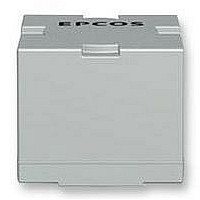B82442A1334K EPCOS Inc, B82442A1334K Datasheet - Page 2

B82442A1334K
Manufacturer Part Number
B82442A1334K
Description
INDUCTOR, 2220 CASE, 330UH
Manufacturer
EPCOS Inc
Series
SIMIDr
Specifications of B82442A1334K
Inductance Tolerance
± 10%
Dc Resistance Max
3.92ohm
Dc Current Rating
140mA
Resonant Frequency
3.2MHz
Q @ Vr F
20
Core Material
Ferrite
Inductor Case Style
2220
No. Of Pins
2
Inductance
330µH
Tolerance
10 %
Maximum Dc Current
140 mAmps
Maximum Dc Resistance
3.92 Ohms
Self Resonant Frequency
3.2 MHz
Q Minimum
20
Operating Temperature Range
- 55 C to + 150 C
Termination Style
SMD/SMT
Package / Case
2220 (5650 metric)
Dimensions
5 mm W x 5.6 mm L
Test Frequency
0.796 MHz
Svhc
No SVHC (18-Jun-2010)
Rohs Compliant
Yes
Lead Free Status / RoHS Status
Lead free / RoHS Compliant
Available stocks
Company
Part Number
Manufacturer
Quantity
Price
Company:
Part Number:
B82442A1334K
Manufacturer:
EPCOS
Quantity:
12 000
Company:
Part Number:
B82442A1334K000
Manufacturer:
EPCOS
Quantity:
60 000
Part Number:
B82442A1334K000
Manufacturer:
EPCOS/爱普科斯
Quantity:
20 000
1.3
Inductive components are used for magnetic energy storage in all kinds of switch-mode power sup-
plies and DC/DC converters. For example, the SIMID 1812 product range is used in low-power step-
up converters in automobile electronics and in battery-powered equipment. They can be subjected
for short periods to currents which are the quadruple of their current rating without any saturation
effects occurring.
1.4
For broadband interference suppression, current-compensated chokes with ring cores or D cores
and powder core chokes are especially suitable.
Apart from use as filters in mains and other power supply lines, such chokes are important for data
lines as used in telecommunications engineering, e. g. in NTBAs (Network Termination Basic Ac-
cess Units, ISDN), in line cards in telephone exchanges (ISDN and analog) and in the fast-expand-
ing CAN bus application field (CAN = Controller Area Network) in automotive electronics.
Almost all the component families are approved in accordance with the main international stan-
dards. All chokes for low-frequency mains networks are dimensioned and tested in compliance with
the applicable EN and IEC standards.
Inductive components with particularly good RF characteristics are achieved by the use of ungapped
cores. The manufacturing methods developed by EPCOS lead to good reproducibility of the attenua-
tion characteristics and enable the production of high-quality components at a favorable price.
The company’s many years of experience guarantee that customers quickly and economically ob-
tain just the right solutions to their EMC problems. Our own EMC laboratory in Regensburg or one
of our European EMC partner laboratories is at your disposal at all times to help with professional
advice and in carrying out measurements (also refer to the
1.4.1
Interference voltages and currents can be grouped into common-mode interference, differential-
mode interference and unsymmetrical interference:
asymmetrical
asymmetrische
propagation
1a
Ausbreitung
General Technical Information
Common-mode interference (asymmetrical interference):
– occurs between all lines in a cable and reference potential
– occurs mainly at high frequencies (from approximately 1 MHz upwards).
Differential-mode interference (symmetrical interference):
– occurs between two lines (L-L, L-N)
– occurs mainly at low frequencies (up to several hundred kHz).
U
as
Switch-mode power supplies, DC/DC converters
EMC applications
Propagation of interference
symmetrical
propagation
symmetrische
1b
Ausbreitung
U
s
unsymmetrical
unsymmetrische
(fig.
propagation
1c
U
Ausbreitung
us1
1b),
10
U
SSB1465-P
us2
04/00
SSB1465-P
chapter on
(fig.
1a),
“Services”).
U = V = voltage
Fig. 1
Propagation modes

















